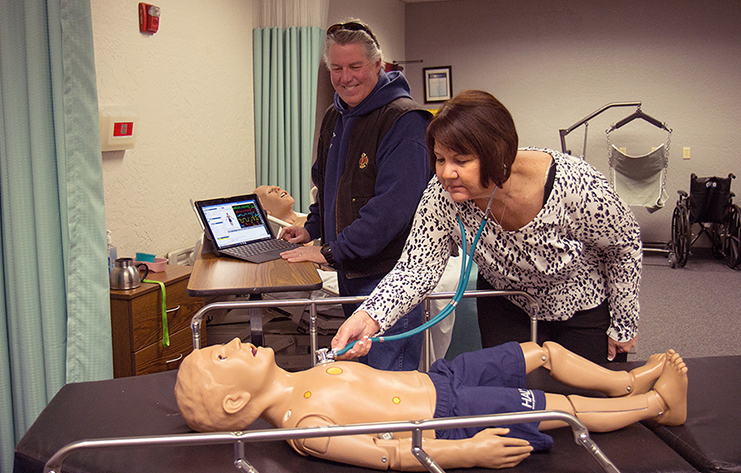
Lori Edwards, CCC’s Director of Nursing and Allied Health, checks the heart rate of “Little Johnnie” as Dave Manning, CCC’s Fire Science and Emergency Medical Services Coordinator, observes. Courtesy photo.
FLAGSTAFF — A new simulator mannequin has joined the Coconino Community College team to help students in the health professions get important hands-on training.
The mannequin, a pediatric version of Trauma HAL nicknamed “Little Johnnie,” blinks his eyes, talks and even bleeds. Students can ask him questions to find out what ails him, just like any human. He joins his older counterpart, an adult simulator mannequin called Trauma HAL.
“Nursing, Emergency Medical Service, Fire, Paramedic and Certified Nursing Assistant, will all benefit from HAL and Little Johnnie,” said Lori Edwards, CCC’s Director of Nursing and Allied Health. “Even though we have HAL, the students need to learn about pediatrics as well. Children have different scenarios and lifesaving treatments than adults.”
Just like Trauma HAL, Little Johnnie has lungs, organs, ribs and plumbing. He comes with a variety of “wound packages” for the students to learn from. Among them are broken bones, sores, burns and even amputations. Like HAL, Little Johnnie is equipped with computer technology that allows for wireless diagnostics and interaction between students and patient through a proctor-assisted process.
“Having little Johnnie with HAL enables the EMS student in the field to treat both together,” Edwards said. “Scenarios can be created to include traffic accidents, home accidents, or any trauma where a family may be together. Students will also have the ability to assess and treat in the lab prior to going to the clinical facility and working with real patients.”
Trauma HAL, who made his debut last year, has been around town participating in a variety of training scenarios. He has also been instrumental in assessment training of the students. Little Johnnie is scheduled to be included in trainings in the next month.
“We are very happy to have Little Johnnie with us at CCC,” Edwards said. “To have real-life simulation enhances the student learning and retention.”
The purchase of Little Johnnie was nearly $40,000. Funding for Little Johnnie came from the Northern Arizona Healthcare Foundation and the Capstone Health Fund through a grant from the Arizona Community Foundation of Flagstaff (Healthcare Fund). Additional funding came from a Perkins Grant from the U.S. Department of Education.
About Coconino Community College: Coconino Community College faculty and staff are dedicated to promoting an environment of excellence to support students. Since 1991, CCC has served residents across 18,000 square miles of Coconino County. The College has helped create the region’s skilled workforce, with the goal of improving the lives of our residents through workforce development and higher education. CCC has served more than 75,000 students countywide, with two campuses in Flagstaff and an instructional site in Page.
CCC provides affordable tuition and a variety of certificates and degrees including career/technical programs with more than 50 certificate programs and two-year associate degrees in various fields. Those fields include nursing, fire science, law enforcement and business. Additionally, CCC has programs that ease student transition to any of the three state universities.
CCC reaches out to the more rural portions of the County including Williams, the Grand Canyon/Tusayan, Page/Lake Powell, Fredonia, Tuba City and other remote areas on the Navajo, Hopi and Supai Tribal Lands. Instructional sites offer classes through online, in-person and Interactive Television classes to meet the needs of students in these rural and remote areas. Nearly 20 percent of CCC’s students are Native American learners.
